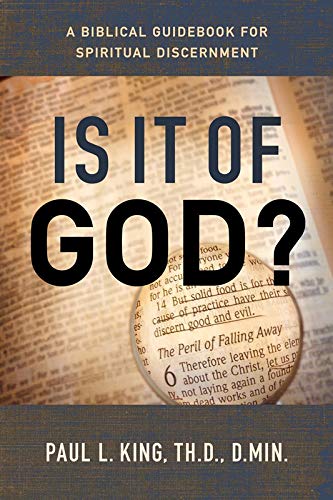Basic Biblical Principles of Discernment

This excerpt is Chapter 3 of Paul L. King, Is It Of God? A Biblical Guidebook For Spiritual Discernment Volume 1 (Newberry, FL: Bridge-Logos, 2019), 384 pages, ISBN 9781610364065.
Read John Lathrop’s review.
Further Confirmation of Two or More Scriptures.
“Every matter must be established by the testimony of two or three witnesses” (2 Cor 13:1). This is the testimony of Scripture confirming itself. Just because something occurs in Scripture does not necessarily mean it is repeatable. We must not base a doctrine or practice or acceptance of a manifestation on something we find just once in Scripture. That is called “proof-texting.”
For example, Mormons practice baptism for the dead based on an obscure statement by Paul: “Otherwise, what will those do who are baptized for the dead? If the dead are not raised at all, why then are they baptized for them?” (1 Cor 15:29). This is an unclear passage with questionable meaning, and this practice is found nowhere else in Scripture. It is not commanded or recommended. Therefore, we cannot build a doctrine or practice around a singular occurrence.
We need to compare Scripture with Scripture. If we see something repeated two or more times, we can perhaps discern a general pattern (but still not an absolute). New Testament scholar Gordon Fee notes, even that which is normal does not mean that it is normative: “Unless Scripture explicitly tells us we must do something, what is merely narrated or described can never function in a normative way. … We would do well to … not confuse normalcy with normativeness. … the precedent does not establish a norm for specific action.”[ii]
If we do not have a definite green light from clear scriptural precedent, then we need to proceed with a blinking yellow light caution by exercising the other discernment principles that follow.
Discernment Principle 2: Investigate for Scriptural Harmony
If no biblical precedent can be found, is this teaching, practice or manifestation in harmony with Scripture? Lacking biblical precedent may be cause to question its validity, but it does not automatically rule it out as being from God. This means proceeding with a blinking yellow light, looking in all directions and prepared to stop if warranted. At least five questions need to be considered:
- Does any other precedent exist for this teaching, practice, or manifestation that is in harmony in Scripture? Paul cites sources outside of Scripture—pagan philosophers and prophets—to make his points. Likewise, both Peter and Jude cite writings outside of the Bible that are consistent with Scripture. Blinking yellow light that could turn to green.
- Does this teaching, practice, or manifestation contradict or compromise Scripture? Red light!

- Does this teaching, practice, or manifestation take anything away from Scripture? Red light! “You shall not add to the word which I command you, nor take from it, that you may keep the commandments of the Lord your God which I command you” (Deut 4:2). (See also Deut 12:32).
- Does this teaching, practice, or manifestation add to Scripture, making Scripture insufficient for salvation and truth? Red light! “Every word of God is pure; He is a shield to those who put their trust in Him. Do not add to His words, lest He rebuke you, and you be found a liar” (Prov 30:5-6). (See also Eccl. 3:14 and Rev 22:19).
- Does this teaching, practice, or manifestation go beyond Scripture—outside the bounds of Scripture? Red light! “Do not go beyond what is written” (1 Cor 4:6, NIV). Paul’s use of the Greek term translated “what is written” always means Scripture.
- Do any biblical commands, principles, or examples question or cast doubt on this teaching, practice, or manifestation as not being in harmony with Scripture? Yellow light, be prepared to stop if necessary.
- Do any biblical commands, principles, or examples allow for the possibility of this practice, teaching, or manifestation as being in harmony with Scripture? Maybe— blinking yellow light—proceed with caution.
Category: Biblical Studies, Summer 2019


